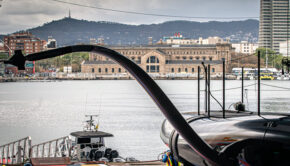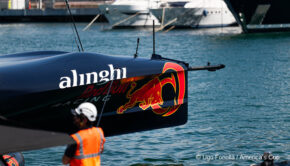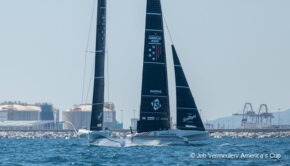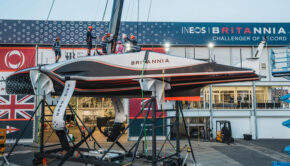Russell Coutts: In his own words
Published on December 3rd, 2014
It has been 14 months since Oracle Team USA successfully defended the America’s Cup on San Francisco Bay. During that time, team CEO Sir Russell Coutts looked hard at the plan he helped to create for the 34th edition, and considered what steps were needed in hosting the next event. With the 35th America’s Cup now revealed to be Bermuda in 2017, Scuttlebutt editor Craig Leweck quizzed Russell to gain some insight into the process and future plans…
With the amazing display of racing the AC72s on San Francisco Bay in 2013, and the epic comeback by your team, interest in the America’s Cup was quite high. However, 14 months later, a lot of that momentum has now been lost. Explain why the planning takes so long?
Well let’s go back a few years to past America’s Cups. For example, when New Zealand won in 1995, it took five years. The next America’s Cup was in 2000, and it took a long time to develop that venue. With something as involved as this, where you’ve got broadcast contracts that affect the timing, you can’t just walk into a broadcaster and say, “Right, well we’ve got this great race going on, let’s screen it on your television program.” And they’ll say, “Well actually, we’ve got other programming on.” Even in 2017.
There are a whole range of considerations we had to balance and weigh up throughout this venue process, and that’s why you need the time to discuss all of those questions, and issues, and so forth, with the various parties. Not just the party that you’re necessarily negotiating with, but other interested parties, and figure things out.
Let’s discuss two of the key criteria.
One is having all of the teams based in one area that overlooks the course, which could also incorporate a central village. That was certainly one of the considerations.
The other consideration was time zone. Particularly when you look at who the location is for, certainly, most of the teams – in fact, four of the current six teams – are European-based. The time zone, particularly once you started a discussion with those European broadcasters, becomes a key point in the whole process.
When you think about all of the people that are outside the stadium, that are watching it on the broadcast platforms, this is a key consideration, that I suggest, the America’s Cup has not really got right, until now. It’s one of the main reasons why the dates weren’t announced when the Protocol was issued. A lot of people said to me actually, “Hey guys, how come you didn’t announce the dates?” And my answer to them was, “That we have to work through that with the broadcasters.”
If we want television for this event – and I’d assume that all of the teams definitely do; in fact, that’s not an assumption, we know that’s a fact – then you’ve got to get those sort of decisions right, and make sure that you’re in broadcast windows that are going to create value for the teams and their sponsors.
Commercial interest has certainly complicated the process to organize the America’s Cup, hasn’t it?
The broadcast is a major commercial element of the puzzle, which is why that was a major consideration. But there are other major commercial considerations as well that are major parts of the puzzle. I’ll give you another example – you go to any major sports event in the world, and there are many components to it, but two of the major factors facing a sports event are: the sponsorship component and the infrastructure component.
Particularly with America’s Cup, where you’re moving to a potentially new venue, and in fact, even if we got it staged in San Francisco again, we would’ve had to work through both the sponsorship and infrastructure components again. So this is the same process for most sporting events. And when we looked at the venue decision in terms of that criteria, Bermuda provided for both of those elements in a very, very efficient and well-run way.
So having all the team bases in one location was a priority… was that a strike against the other venue finalist, San Diego?
I’m not going to criticize any other venue, as many of the venues put a lot of effort to try and meet certain criteria. But, for example, that would have been very, very difficult in San Diego. It’s just that they didn’t have an open space which could effectively house even six AC62 teams together. But I should add, that’s quite a difficult criteria for most of venues to achieve.
Since the AC62 rule was released, there had been discussion of making the boat smaller. Is that still under consideration?
Part the way through the venue process, we discussed with the teams downscaling the size of the boats to give us more room to maneuver with some of the venues under consideration. It was quite an intense and robust discussion, with consideration also toward moving these boats around the world, the future of these boats, the costs, and so forth, how many crew they should have. But the teams didn’t vote for downsizing, for various good reasons actually. So anyway, we went through that process and that’s where we ended up, and I think it was – given the information – we’ve made the right decision.
There is a contingent that is critical of the venue now being held outside of the defender’s country. The America’s Cup is draped in tradition, and having the venue in Bermuda is contrary to this tradition. Has the America’s Cup now moved beyond this sentiment that the event should be hosted in front of the team’s club?
We clearly think it has moved beyond that. You’re right, we could have considered it, for example, selfishly, and said, “We’re just going to host it in front of our own club” without considering broadcast time zones, without considering where the other teams could be housed. We could have looked at it very narrowly, but this is an international event. It’s got international teams, and those teams have sponsors, and the broadcasters are an important part of that sponsorship. So we looked at some of those things and weighted them very, very highly.
Some people, no doubt, would rate very, very highly that the race should be conducted in front of their home club and membership, allowing their members to sit on their top balcony and watch the race. No doubt some people would rate that very highly. That was an item we weighted, for sure, but it was weighted much, much lower than, for example, broadcast efficiency.
Speaking of the event outgrowing past tendencies, the responsibility of the defender hosting the event inevitably creates a stop-start scenario for each America’s Cup. How much a burden is this now? Has the event outgrown this requirement?
The teams are in active discussions now about all kinds of efficiencies for the future, and I think you know, we were actually proposing talks to begin six to eight months before the last Cup ended. We were wanting to get all the teams together to discuss, “Okay, can we agree on the type of boat for next time? Can we agree on the year for next time? What are the areas of agreement we can have?” But unfortunately, we weren’t able to put anything in place last time, as various people did not want to enter into that process.
However, this time, these types of discussions are very active; the competitor’s forum has been very active. And you know what I think one of the main differences is, Craig? One of the main differences is, rather than having the rules advisers from each of the teams having these discussions, it is now the skippers of the teams who are sitting in that room having those discussions.
Now I think that’s, frankly, a quantum shift on where the America’s Cup’s been in the past. Now you’ve got Jimmy Spithill sitting there. You’ve got, often, Dean Barker sitting there. You’ve often got Nathan Outteridge or Iain Percy sitting there. You’ve got Franck Cammas sitting there. You’ve got sailors sitting there, making these decisions now. Also the design personnel are involved. They all have a vested interest in the future of the Cup.
So now, I actually believe that those discussions – well in fact I don’t believe, I know, those discussions have gone way, way further than any previous experience I’ve had with America’s Cup. And they are continuing to going way further.
Beyond the five challengers that have formally entered, it was announced that there are two additional groups that have expressed serious interest to enter as challenger. What are the guidelines for accepting more entries?
First of all, that time window is closing fast. We’re now in the process of modifying AC45’s into foiling boats, and that is right on the deadlines of achieving that before the first AC World Series event in June 2015. So, there’s certain practical constraints that we’ve got on for accepting new entries. But putting that to the side for a moment, the criteria is that any prospective group has to prove adequate funding, and then they have to follow obviously the normal entry requirements per the America’s Cup Deed of Gift. But, we haven’t – and won’t – imply additional financial obligations on any new competitors, and are considering them on a case-by-case basis. If we are to consider accepting any late entry, we really have to make sure they have the funding to make it through to the end of the Cup.
What has been decided in regard to the challenger elimination series? The Protocol indicates a scenario where teams may not advance to the final venue in Bermuda.
That’s under discussion now, and frankly, Craig, I’m pretty limited about what I can tell you. What I can tell you is, all of the teams will be going to Bermuda.
What are the immediate plans for Oracle Team USA?
We will be moving our base to Bermuda. The team’s got to do one last session in San Francisco in February. They’re going to be sailing a new test boat that has been built. That’s going to be starting in February in San Francisco and then the whole operation will move to Bermuda. The team is planning on being there in April.
With the venue now officially revealed, and some of the other details now publicly known, how good does it feel to be at this stage?
It’s been a very, very enjoyable process. I’m really happy with where are; this is a fantastic decision, and I’m absolutely convinced this is going to be a fantastic America’s Cup. It’s not a PR sell or anything like that; I believe it. I really do. It’s going to be the best one yet. I’m not over-hyping it as you’ve criticised certain people, rightly so, for the over-hype during the last event. It’s just that I reckon I’ve got good reason to believe this America’s Cup is going to be great.









 We’ll keep your information safe.
We’ll keep your information safe.